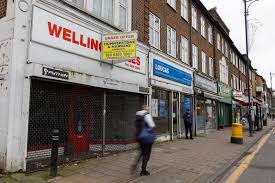UK’s Next PM Faces Rise in Economic Misery Right After Election

The UK’s next government will confront a fresh increase in economic misery levels in its first months in office as voters feel the pinch from rising unemployment.
Having retreated in recent months thanks to cooling inflation, the Misery Index — created in the 1970s to capture the combined impact of unemployment and inflation — is set to worsen again over the next 18 months in the UK. This time around, not having a job is likely to be the main pain point.
The trend points to how the next prime minister will struggle to make Britons feel more upbeat about their economic fortunes. Polls predict voters will elect Keir Starmer’s Labour into government on July 4, putting an end to 14 years of Tory rule that oversaw the worst cost-of-living crisis in decades.
Since Prime Minister Rishi Sunak took office in October 2022, the misery index has averaged around 11, higher than under every administration from Tony Blair, bar Liz Truss’s brief but damaging stint as a PM. As inflation retreated to the 2% target from double digits and workers start to see real incomes grow again, the gauge has slipped to around 6.
It’s now predicted to increase to 7.5 on average in the first 18 months after the new administration takes office, according to a Bloomberg analysis of data from the Office for National Statistics and Bank of England forecasts.
Unemployment is set to be responsible for almost 70% of the score, the most since David Cameron’s administration, which saw the economy through the aftermath of the 2008 Global Financial Crisis. The BOE forecasts joblessness will rise gradually from around 4% toward 5.5% by the end of 2025, which would be the highest since 2015.
“Ten to fifteen years ago, if you said to people unemployment is going to be 5%, they would’ve said that’s a great outcome, but now we’re talking about unemployment rising from what was a much lower point,” said Hetal Mehta, head of economic research at St. James’s Place. “It will be a difficult message for any new government to manage.”
While the UK economy struggled with sluggish growth, low productivity and high interest rates, wages have risen at triple the inflation rate and firms have been hoarding staff in hopes that easing borrowing costs would eventually boost demand.
Those hopes have yet to materialize. BOE Governor Andrew Bailey and his colleagues voted to keep rates unchanged at 5.25% Thursday.
BOE policymaker Megan Greene warned earlier this year that unemployment may rise further than forecast if squeezed-out firms start unwinding their hiring. The labor market has started loosening in recent months, with falling vacancies and unemployment rising to a two-year high.
Unemployment is only part of the story. Around 800,000 people dropped out of the labor force during Covid, mostly due to long-term sickness, and many haven’t returned. Almost a fourth of the UK’s working-age population is economically inactive, the most since 2015, while long-term sickness increased again in April to a new record of 2.83 million.
“We had a rise in the employment rate and a rise in the participation rate in the previous decade, and it’s gone into reverse in the last four years,” said Gregory Thwaites, research director at the Resolution Foundation. “Fixing that is the biggest challenge the government faces in the labor market.”
A drop in the number of people holding jobs could do particularly bad damage to the national mood. An 2001 study conducted by Oswald and his colleagues found that jobs are nearly twice as important as low inflation for happiness. Tracking the overall well-being levels of over 250,000 participants from the US and Europe, the researchers found that a 1-point increase in unemployment had the same effect as a 2-point increase in inflation.
The index might also underestimate actual misery levels because it doesn’t capture the effects of dropping out of the labor market, according to Oswald. Mental health conditions like depression or anxiety were among the main health conditions cited by those who dropped out of the jobs market, according to official data.
“If you lost your job, it would hurt a lot psychologically and part of it would be from the drop in income,” Oswald said. “But most of the effect is coming through non-financial things like loss of identity, loss of self-esteem, general decline in status in society’s eyes.”
In a bid to improve how families feel about their finances, Labour — campaigning on a message of “change” — has promised to usher in a “New Deal for Working People” in its first 100 days in office, which would include tying the minimum wage to cost-of-living increases. The Conservatives, who delivered a 9.8% rise in the minimum wage in April, are pledging to increase that even further and cut National Insurance.
“If the economy is growing below trend, that’s putting up pressure on unemployment,” Mehta said. “I don’t think we have the fiscal power to boost growth through a big public investment program unless that came with very focused tax raising measures which might be difficult.”





